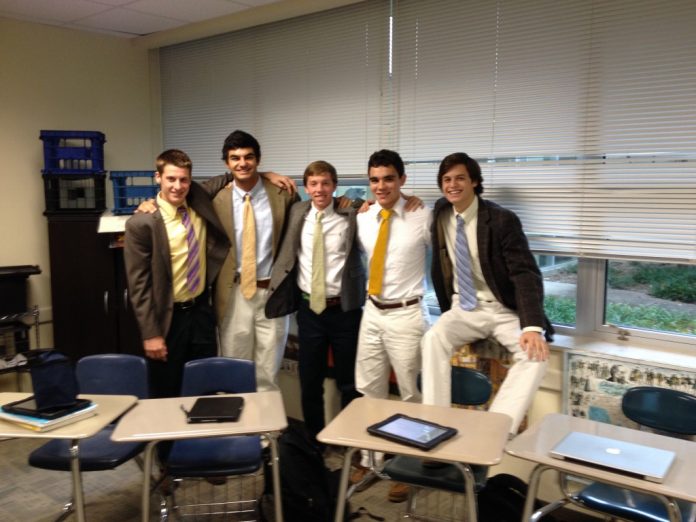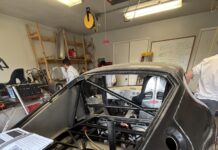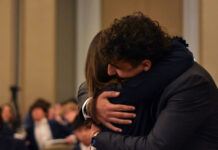“BEEP, BEEP, BEEP, BEEP,” goes the alarm of junior Garrett Amy ’15 at 6 a.m. as he wakes up for varsity football practice. After the tough practice he heads to school for the day, trudging through an AP U.S. History test and Honors Pre-Calculus quiz. He attends an Interact meeting and Student Council meeting during lunch, and works on his Honors Spanish III project. Then, after school, he works out again at another football practice, followed by a Boy Scout meeting. He stops by his girlfriend’s house to talk for a bit. Finally, he arrives home at 8 p.m., hops in and out of the shower, shovels down a quick supper, and begins his massive mountain of homework. At 2 a.m., he puts down his pencil and falls asleep, only to wake up tomorrow to do the same thing again.
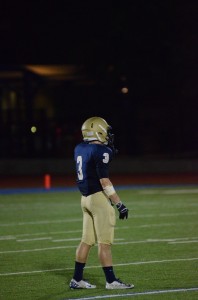
Sound like fun? Probably not. Most of us don’t have the capacity, strength, and/or desire to keep up with a schedule like Garrett’s. However, there are the rare few who do, those who want to grind through a tough schedule, striving to excel in both school and sports. These select few, numbering a few dozen at max, strike the intricate balance between academics, social life, religion, and athletics throughout their four-year careers at Jesuit. They are dedicated. They are hard-working. They are driven. They are the Scholar-Athletes of Jesuit.
What does it take to be a scholar-athlete? How much of a commitment is it? Is it worth the extra effort? These are just a few of the questions that I sought to answer as I interviewed some of the most notable scholar athletes in the Jesuit community. The seven students I chose each participate in a varsity sport, and in addition take multiple Advanced Placement or Honors level courses.
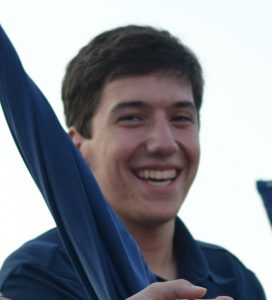
One aspect that all seven mentioned was the necessity to sacrifice things, such as time, sleep, fun with friends, and meals. John Michael Lucido ’14 emphasized that, “You have to be willing to give up time with your friends, sleep, TV, stuff that most teenagers take for granted” like “social networking” and video games. “You have to give up sleep and be exhausted. That is the only way,” said Lucido. It is no easy feat. They must have mental strength to realize when they have time for fun, and when they don’t.
Garrett agreed with Lucido, saying, “I view sleep as my enemy. I really do. Sleep is failure. To be honest. if I would give into sleep, I would be failing right now, but I don’t. I know sleep is essential to my health, but I don’t know, I think I’m pretty healthy right now. I drink plenty of water, I eat right” to stay healthy instead. Obviously, scholar-athletes cannot enjoy a decent sleep each and every night with their hectic workloads that often include multiple AP or Honors courses on top of their workout schedules.
Michael Bejarano ’14, for instance, takes “AP Human Geography, Genes and Evolution, and AP Language and Composition…AP Macroeconomics, Inter-religious Dialogue, and Honors Pre-Calculus” in addition to extracurriculars and basketball practice.
Michael and the rest of the scholar-athletes must not only show up to classes and practices, but also put in 110% effort each play, each test, each lap to remain on varsity squads and in advanced classrooms. Joe Wengierski ’14 explained that “it takes hard work, you don’t get better just by showing up to practice, you have to push yourself physically and mentally during practice and games” to really excel on the field and in the classroom.
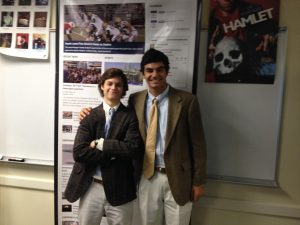
Golfer Sam Rosenberg ’14 made a similar point, noting that “practicing efficiently is much more important than practicing a lot,” and it can help save time to allow him to participate in other extracurriculars and difficult classes.
The few members of the scholar-athlete club must, like Sam, use their time wisely and finish their work efficiently if they can ever have a chance at success. Lacrosse player Jason Myers ’14 explains, “Sometimes I cannot start my homework until 9:30 [p.m.] I have had to learn to do homework before practice. I have to get stuff done in free periods at a quicker pace and the biggest part is that I have had to teach myself to go to sleep.” He does not have the time to waste completing homework perfectly or taking many breaks from work. As a whole, the scholar-athlete circle must take advantage of every second of time that they are granted, for they cannot afford to spend time on petty details or distractions.
These scholar-athletes can not do everything on their own—instead, they must rely on support from friends, family, and teachers to help them through their difficult schedules. Lucido, for example, relies on God to push him through tough times, declaring that you need “a relationship with God . If you believe that God gives you gifts, you are turning your eyes away from him if you are not using these gifts, whether they be in school, sports, choir, theatre, in McDonalds, etc.” When he has no one else to talk to, he can always find the Lord ready to listen, a steady, encouraging presence during times of chaos.
Many factors contribute to the fact that there are so few elite student athletes at Jesuit. One of these, sadly, is stereotypical. The media often presents athletes as “dumb jocks” who only spend their time eating and lifting. It is a flaw of our culture, an assumption that should not be made. Smart kids can be amazing athletes, and amazing athletes can be smart kids. There does not need to be a choice between the two, because both are possible. Rosenberg said, “I think part of it is thinking that because they’re an athlete, they do not have to do as well in school. They think they’re not held to the same standard. I also think it has to do with time. Many athletes devote so much time to their passion, they leave little time to devote to school, and they feel like they cannot succeed in this time crunch.”
Swimmer Matthew Bedard ’14 attributed the reason for such a small number of genuine student-athletes to “the culture of the whole idea[checklist]
- Item #1
- Item #2
- Item #3
[/checklist][checklist]
- Item #1
- Item #2
- Item #3
[/checklist]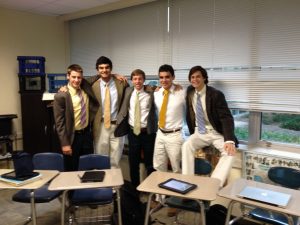 from elementary middle school that you are either smart or an athlete. When you get to high school and you have the opportunity to do both, a lot of students are caught in the mentality that you are either a scholar or an athlete and don’t realize you can do both. A lot of times when you get to junior or senior year you realize that you could have done both, gotten better grades or played a sport. It is a culture. People are given this mindset by coaches and teachers when they are younger and when they get to high school it is already so deep in their minds that they cannot break it. It is unfortunate.”
from elementary middle school that you are either smart or an athlete. When you get to high school and you have the opportunity to do both, a lot of students are caught in the mentality that you are either a scholar or an athlete and don’t realize you can do both. A lot of times when you get to junior or senior year you realize that you could have done both, gotten better grades or played a sport. It is a culture. People are given this mindset by coaches and teachers when they are younger and when they get to high school it is already so deep in their minds that they cannot break it. It is unfortunate.”
In other words, Jesuit opens doors for students to pursue all of their passions, whether academic, religious, or athletic. Students just need to take advantage of all the unique opportunities at Jesuit, and understand that Jesuit is not an ordinary school. Smart kids can excel at sports. Athletes can thrive in the classroom. Jesuit is just different than other schools, yet students often do not realize this until it is too late. The few that do, and take advantage, are the true student-athletes
These guys cannot spend time on trivial matters, such as texting and social networking. They cannot put off their work, for they simply do not have the time to waste. John Michael Lucido explained, “I think that it has taught me not to procrastinate. Like on game nights I have to get my homework done at school. Sometimes that means you might have to eat lunch in the library and you can’t talk to your friend but it teaches you that you can’t procrastinate because you don’t have the time.”
Again, there will be sacrifices. However, these sacrifices are necessary in order to properly develop oneself according to the “Jesuit Profile of the Graduate at Graduation,” which presents the ideal student as Physically Fit, Intellectually Competent, Open to Growth, Religious, Loving, and Committed to Working for Justice. At graduation, few students will be able to say that completely demonstrate each and every aspect of the profile. The scholar-athletes, however, try to do just that. Joe Wengierski, for instance, can fill nearly all facets of the profile at this time in his senior year. He stays Physically Fit by “trying [his hardest in morning practice, and then again during evening practice,” and becomes Intellectually Competent by taking “a lot of AP courses” such as AP Calculus, AP Biology, AP Economics, AP Government, and AP English. He depicts Open to Growth by “growing on and off the field, making changes that teammates think can win…and/or making adjustments from an academic standpoint” and depicts Religious by “always [going] to Mass on Sundays and [taking] advantage of school-offered reconciliation.” In addition, he acts Loving, “being there for [his] brothers at school, outside school, anywhere if they need [his] help.” Finally, Wengierski is Committed to Working for Justice, exemplified by his weekly participation in “Wednesday service.”
Most Jesuit students strive to attain the Profile of the Graduate, and many will encompass the majority of the six parts by the time they leave Jesuit; meanwhile, only a select group of outstanding students like Joe will exemplify the consummate Profile. These students can serve as role models to the younger members of the Jesuit community as examples to emulate of a well-rounded individuals who seek to glorify God in all that they do, academically, athletically, extracurricularly, and religiously.

So you may be wondering: “What are the secrets of the scholar-athletes? How can I become one of them?” Each has their own unique routines and ways of achieving their goals, but all basically follow the same principles. They all use their time wisely, stay out of trouble, and work efficiently. Matthew Bedard, when asked to give advice to freshmen, asserted, “Make decisions and understand that there are only 24 hours in a day and that you have to have some of that time for sleeping but at the same time don’t restrict yourself; plenty of people do athletics and school, so don’t be afraid. Especially freshmen year, when your classes are less difficult, it is a lot easier to balance it. Go out there and join something that you want to do, and if you discover that you have a passion for it, then continue doing it, and if you are committed to it and are really committed to school you can make it happen. It is just a matter of balancing your time and knowing when things are due and keeping all the balls in the air.”
Being a scholar-athlete is not solely based on God-given talent; instead, it is largely the product of will and time management. One does not have to be the smartest or the best athlete to classify himself as a scholar-athlete. Although superior natural ability can make achieving such status more facile for some, it is not a requisite for “initiation” into the select faction of Jesuit.
Bedard says it can be quite simple, encouraging students: “Don’t be afraid to go to your teachers. They are here to help you, especially here at Jesuit. They are going to help you out if you ask them. A lot of teachers are coaches or are involved in athletics, and so don’t be afraid to talk to them and ask for help on assignments but at the same time don’t say ‘I didn’t do your homework because of such and such and such.’ There are plenty of hours in the day and you can balance it if you try.”
One aide that the scholar-athletes find helpful in their quest for excellence are role models. Role models can be as simple and close as a parents or older sibling, or as distant as a celebrity or saint. They can come in all shapes and sizes. Yet they share a certain thing in common: they all serve as examples. We admire these models on behalf of various traits, whether they be the athleticism of a basketball player like Kobe Bryant, the kindness of one’s father, the intelligence of men such as Bill Gates, the financial prowess of investors like T. Boone Pickens, the holiness of religious members such as Pope Francis. Anyone can be a role model to another. The scholar-athletes, while serving as role models for younger Jesuit students to follow, also have inspirational heroes themselves who keep them on track and encourage them to keep working hard and staying on top of their work.
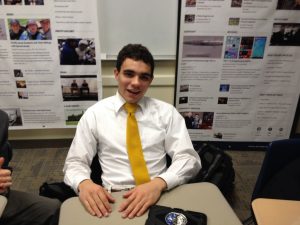
John Michael Lucido attributes much of his success to his father, explaining, “My dad has a doctorate degree in his field of study so obviously he has put in a lot of work but he also played college baseball and he was all academic first team for his conference. From the very beginning he has taught me that school comes first and athletics comes second. Both his life and tells me the example of what being a student athlete means.” Lucido follows in the footsteps of his father, and hopefully one day he will be able to serve as a the same example when he has children of his own.
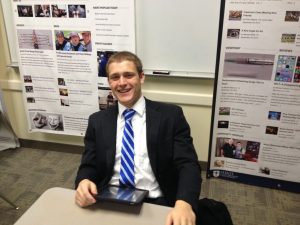
Garrett Amy has multiple role models; for him, role models are those who took advantage of all the time that they were given, using their time to do good rather than wasting it on themselves. “Behind [his] family and Jesus comes St. Ignatius of Loyola, Blessed Pope John Paul II, Pope Francis I, Vince Lombardi, Mahatma Gandhi, Dwight D. Eisenhower.” All were outstanding men who tended to put others before themselves, serving as Men for Others and using every day as if it were their last.
Garrett emphasizes that “time is valuable. And everyone gets the same amount of time each day. With Mother Teresa, John Paul II, etc. it’s just what they did with that time that made them so great. We all have 24 hours in a day to do what we do. It’s just how some people utilized that 24 hours that made them stand out and made them great.”
The scholar-athletes of Jesuit definitely use the 24 hours that they have each day to the max. Sleeping little and working relentlessly, the scholar-athletes stand out among the Jesuit community for their excellence, both in the classroom and on the field. Striving to reach the Profile of the Graduate at Graduation, they drive themselves to their physical and mental limits to realize their full potential as scholar-athletes.


